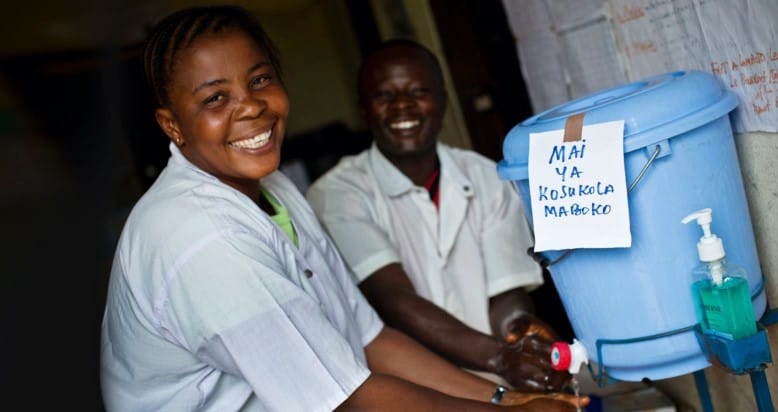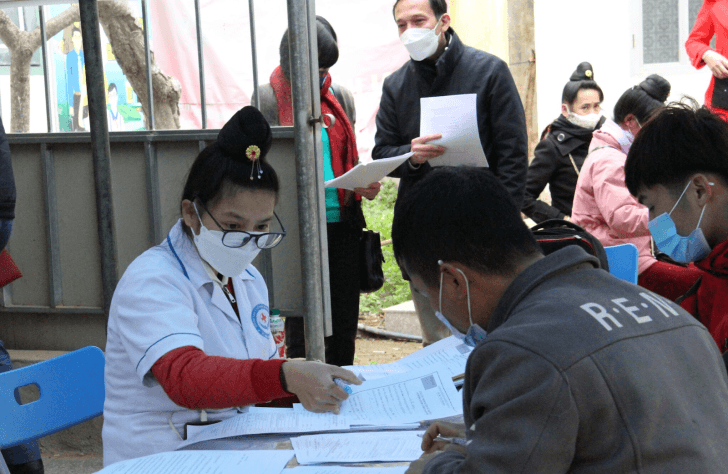
Maternal and Child Health, Vaccines, WASH
Faith-based organizations are the leading edge of the local partnerships of the future
by Dr. Koki Agarwal, Project Director, USAID MOMENTUM Country and Global Leadership; Vice President, DC Operations, Jhpiego
For the past 20 years, I have led global USAID projects on maternal, newborn, and child health—this work has given me a front row seat to witness incredible progress for mothers and children around the globe.
In the last 30 years, for example, global maternal deaths have dropped dramatically—by more than 40 percent. Similar declines were seen for newborn deaths.
But many countries, particularly in Africa, are at risk of missing goals to reduce maternal, newborn, and child mortality and morbidity. It’s clear that we can’t accelerate progress by continuing with our usual approaches and partnerships. The global pandemic taught us many things, including that there is no one-size-fits-all approach to improving health and that we need to focus on strengthening the resilience of our health systems and redouble our efforts at working in partnerships. It’s clear that the major challenges of our time require a different way of working.
On USAID’s MOMENTUM Country and Global Leadership project, we have seen partnerships—new kinds of partnerships that are inclusive, flexible, responsive, and most of all locally-led—as key to breaking the ‘business as usual’ cycle and discovering new ways of working for bigger health impact.
In more than 28 countries and at global and regional levels, MOMENTUM Country and Global Leadership works with governments, regional and local organizations, and multilateral institutions to advance access to evidence-based, quality, and integrated healthcare for mothers, newborns, children, and youth. Partnerships are the bedrock of that work. MOMENTUM has worked with more than 100 local partners over the past four years, including many faith-based organizations connected through CCIH, which leads the project’s faith engagement team.
In the health sector, the value and importance of working with faith-based organizations is well-known. They often have:
✓ Presence on the frontlines of service delivery
✓ The infrastructure and ability to deliver care in remote areas
✓ Deep community networks built on trust
✓ Tremendous impact on norms, values, and behaviors
Without faith entities, millions of people—particularly in hard-to-reach and underserved areas—would be deprived of health services. The value is clear and well-known, but I’d like to show how faith-based organizations (FBOs) are making a difference in the work of a global USAID project like MOMENTUM Country and Global Leadership.
The COVID-19 Recovery
The start of our project essentially coincided with the start of the global COVID-19 pandemic.
We mobilized quickly to provide rapid support to health facilities to minimize the effect of the pandemic on essential health services for women and children, particularly by improving their ability to provide safe, sanitary conditions for their clients through improved infection prevention and control measures.
The scale and capacity of faith-based facilities and networks made them natural and essential partners in this work.
Starting in August 2020, MOMENTUM Country and Global Leadership implemented these improvements in 199 health facilities in Bangladesh, Ghana, India, Sierra Leone, and Uganda—and almost a quarter of these were faith-based facilities. CCIH engaged with faith-based networks in Uganda, Ghana, and Sierra Leone to make this rapid scale up possible and to build the strength and impact of these networks.
In Sierra Leone, for example, the autonomy of the Christian Health Association of Sierra Leone (CHASL) enabled the network to be adaptable and creative in responding to challenges, while its large network gives it access to the varied strengths of its members. This was also an opportunity to boost the voice of Christian health care professionals and to demonstrate their unquestionable importance within Sierra Leone’s health system. In this brief, the CCIH team also distilled important lessons on scaling up similar activities in faith-based facilities that governments and other programs can learn from when building partnerships in the future. (Top photo shows health workers demonstrating their new WASH knowledge after attending a five-day training in clinics in the Democratic Republic of Congo. Photo: Kate Holt/MCSP)
Addressing Vaccine Hesitancy
Another challenge that became stark during the pandemic was that of vaccine hesitancy. Regardless of whether vaccine hesitancy stems from religious convictions, misinformation, or other beliefs and fears, faith actors are highly influential in promoting health behaviors such as vaccination.
As part of MOMENTUM Country and Global Leadership’s larger work to increase vaccine access, CCIH collaborated closely with many faith community leaders to understand concerns about vaccines and to identify promising practices to overcome these concerns. This research filled critical gaps in understanding on how best to work with local faith actors on immunization.
CCIH then took it one step further, creating an evidence-based toolkit to support dialogue on vaccine hesitancy, including practical information on areas like organizing harmonized interfaith vaccine campaigns and engaging with faith-based scientific technical bodies. Ultimately, the toolkit aims to promote the innovative partnerships that will drive vaccine acceptance and uptake— and it is now being implemented in communities Sierra Leone and India.

Supporting very young adolescents
As a key part of our overall efforts, MOMENTUM Country and Global Leadership is supporting countries to design and scale cross-sectoral programming for adolescents to improve their access to information and care on their sexual and reproductive health.
Despite their significant influence within communities, FBOs are rarely equipped with the knowledge, skills, and resources specific to promoting positive health and development among adolescents or the families and communities that support them— representing a missed opportunity.
In Bangladesh, MOMENTUM Country and Global Leadership worked to address this gap by forming a partnership with two FBOs that are part of the CCIH network —World Renew and LAMB Hospital—to strengthen their capacity to deliver a tailored, gender-transformative curriculum on sexual and reproductive health for very young adolescents aged 10-14.
Alongside specific technical support to implement this program, MOMENTUM Country and Global Leadership supported World Renew and LAMB with custom organizational capacity strengthening to strengthen their ability to deliver this type of health and gender programming into the future. And learnings from this activity have been synthesized into a brief that can inform future programming for very young adolescents in Bangladesh and beyond by faith-based organizations.
Inclusive Partnerships for Global Health
These are just a few ways that working with FBOs has been critical to MOMENTUM Country and Global Leadership’s work over the past four years. And with the leadership of our partner CCIH, we are supporting the learnings and platforms that will enhance the impact of FBOs and their networks in the future.
Building strong and inclusive partnerships for global health programs is not future work – it is urgent right now work. And FBOs are indispensable to creating and leading these locally led partnerships of the future.
USAID MOMENTUM is a platinum sponsor of the CCIH 2023 Conference.
